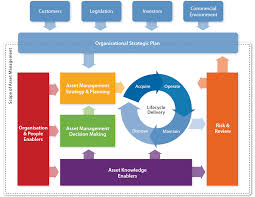Introduction
The asset management of physical assets like chemical plants, power distribution networks, rolling stock, offshore platforms, roads, waterways, buildings, etc. is critical to the economy of many countries. How we manage physical determines the efficiency of companies and how competitive we are in the world market. Much money is spent annually on maintaining and developing the asset base and providing services to improve asset management has in itself become a major competitive market internationally.
Asset Management has been increasingly recognized as the key to improved investment decision making across all sectors, from Oil & Gas, Defence, Aerospace, Manufacturing, Public Transport and Electricity and Water Production & Distribution. Many of them are required by regulators to draw up and present asset management plans.
This training course aims to support this drive to improve management practices by presenting standards, methodologies and guidance how to set up good asset management. The course shows the delegate how the international standards on Asset Management, the Publicly Available Specification PAS 55 and the ISO 55000, can be used to implement the best practices in order to realise higher performance at lower costs within compliance. The course finalises with an assessment of the current state of your Asset Management processes and results.
Objectives
- To provide a step-by-step guide to Asset Management best practices (as part of PAS 55 and ISO 55000), starting with foundations and building up to best practices that will deliver maximum business benefits
- To provide appreciation of PAS 55 and ISO 55000
- To instruct Asset Management optimization best practice methodologies and technologies
- To provide opportunities to discuss and learn the practical application of these best practices, through case studies and exercises
- To provide insight in the current state of Asset Management best practices within the delegates company
Training Methodology
The course is composed in such a way that it can be held for all professionals involved in managing or implementing asset management processes. It is conducted along workshop principles with formal lectures and many interactive exercises. Relevant case studies illustrate the application of each subject in an operations environment and each learning point will be re-enforced with practical exercises. There will be many opportunities for discussion and sharing experiences.
Organizational Impact
Participants attending the seminar will:
- Understand what Asset Management is and how it can contribute to asset effectiveness and efficiency
- Understand the background, application and benefits of PAS 55 and ISO 55000
- Understand the most important Key Performance Areas and related activities and methodologies of Asset Management
- Be able to participate in the implementation and application of the underlying Asset Management methodologies and technologies
- Have insight in the current status of the Best Practices and Performance of the Asset Management process within their organization by assessing the current Asset Management processes and results of the company
Personal Impact
By attending the seminar, participants will add value for themselves. They will thus be able to plan and develop a future career.
Who Should Attend?
The training course will benefit all professionals involved in managing or participating in asset management processes, including all staff in Asset Department, IT Department, Operation Department and Finance Department.
SEMINAR OUTLINE
DAY 1
Introduction to Asset Management & Strategy Framework
- Introduction to program
- Introduction delegates
- Pre-test
- Asset & maintenance management as a business process
- Asset management process model – The Asset Management System
- Strategy framework
- Line of sight
- Asset management policy, asset strategy, asset management strategy
- Asset management objectives (goal setting)
- Asset management plan
- Feedback & improvement
DAY 2
Asset Management Roles + Standards on Asset Management (PAS 55 + ISO 55000)
- Introduction
- Asset Management roles
- Sourcing & outsourcing
- Stakeholder management
- BSI-PAS 55:2008 - a proven standard for Asset Management
- ISO 550000 – the new international standard on Asset Management
- Certification procedure
DAY 3
Good Asset Management Practice – Part 1
- Introduction
- Demand forecasting
- Level of service and performance measures
- Defining the right key performance indicators
- Capacity or utilization monitoring
- Condition assessment and monitoring
- Information & configuration management
- Vendor management & past performance
- Asset procurement
DAY 4
Good Asset Management Practice – Part 2
- Introduction
- Risk management
- Risk Based Maintenance concepts (RBM)
- Life Cycle Costing (LCC)
DAY 5
Assessment & Implementation Aspects
- Introduction
- Asset Management assessment
- Asset Management teams
- Changing the behaviour of people
- Implementation of Asset Management – case study
- Wrap-up

